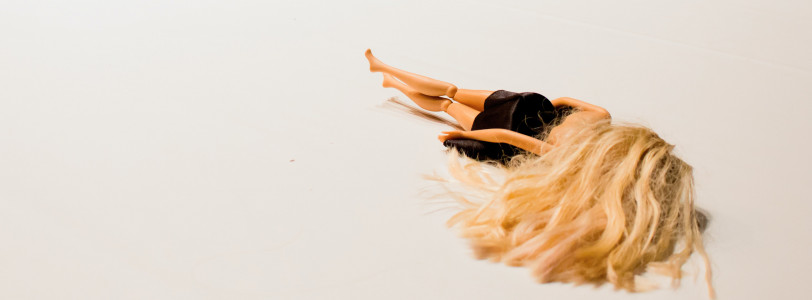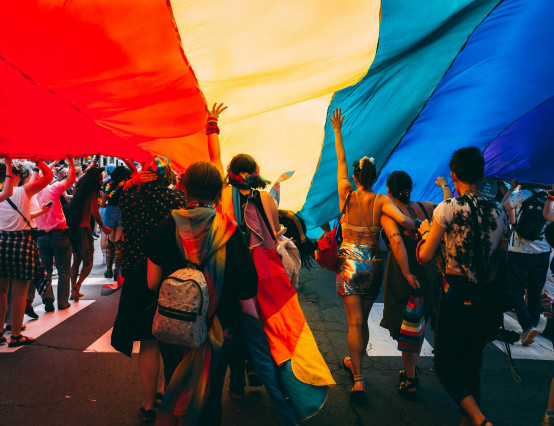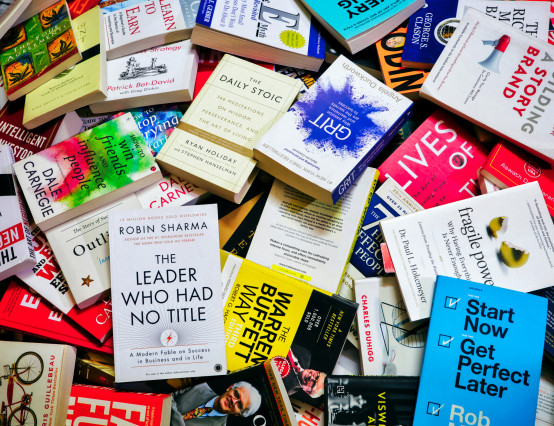It will come as little surprise to you when I say that we live in a world saturated deeply by media imagery. It's on the walls of train station walkways, in our hands as an endless feed to scroll through and among our classrooms' learning plans. To truly believe that you have never consumed media in some shape or form would be borderline impossible.
Now imagine being a piece of media, such as in the instance of a celebrity figure. From a viewing perspective, celebrities are constructed to be consumed. They are a collection of manufactured elements carefully crafted behind the scenes of the public eye, designed to slot together to create the "perfect" star persona. In doing this, a star’s existence and image become deeply intertwined and interchangeable: the image of this person, to the majority, is all they are.
When considering celebrities concerning their body image, Demi Lovato may arise as someone who has been increasingly open about their struggles in recent years during talk-show interviews and through their lyricism. Lovato’s sixth studio album, Dancing With The Devil: The Art of Starting Over (2021), is filled with tracks that delve into the star’s battles with mental health and feelings of inadequacy. Although, the album’s eighth track, ‘Melon Cake’, carries a central message of rebirth. The song provides its listeners with an important window of insight into the life of a star restricted by the entertainment industry to the point where they had had enough.
When Disney’s omnipresence and social media usage have risen through the roof, is it any wonder why people struggle to accept themselves for how and who they are? Each day we look into our mirrors and see someone unfiltered, absent of a princess gown or the unwavering admiration of a prince or the public. Yet, the role models that we listen to and look up to don’t even look like themselves.
We need clarity. We need to break down just what Disney, as a toxic spin doctor of hope, is feeding its viewers and how these visuals have damaged people.
"Disney culture" and the music industry: the "role model" pressure placed upon our role models
Tiny waists, luscious hair and a gorgeous prince ready to wave a wand to fix all of our problems on a whim. The "cult of Disney" and its image are giant and inescapable, as one of the world's leading media corporations that host a variety of different television shows and films.
Lovato, in particular, launched into the public eye after featuring in Camp Rock and Camp Rock 2 on the Disney Channel. Although the television series took steps away from the stereotypical Proppian princess trope, it's interesting to note how actors were still made to feel as though they were inadequate on set. During their time on the show, Lovato’s weight was kept down, their hair was grown long, and "feminine", and they did as they were told to avoid potentially losing their job. These stress-ruined people are the people that we call role models. We don’t see their pressure, the pressure of having the eyes of millions upon you all the time and your image carefully monitored amid the fear of the camera adding ten pounds. The pressure of knowing that you work(ed) in a franchise where the females within its films are all unbelievably perfect princesses. How could you ever compare?
I conducted an Instagram poll asking my followers to answer two simple questions: 'Did you watch the Disney Channel growing up?' and whether they felt positively towards their bodies. Almost 75% of participants answered 'yes' to the first question. However, only 7% of people answered that they felt good in their own skin, with 15% of respondents admitting that they never did. Although there is no way to know with certainty whether the consumption of Disney content holds a significant impact on these figures and related concerns of body image, after taking the time to talk to a number of participants about their thoughts on Disney culture further, it appears possible that it has played a part in some people's experiences.
‘I sacrificed my comfort to satisfy myself with Cinderella’s beauty standards. I have a gorgeous brown shade of skin tone that I despised [...]. The high-heeled slippers, their fair white skin tones, and Snow White’s pink/red blushes are all still distinct in my dreamy mind.’ - Nusrat Ahmed (23).
‘It [Disney] isn’t engaging for me because I can’t identify with it or relate to it at all. It’s more off-putting than anything… I understand the reason behind selling its image as it’s picturesque but [...] people don’t look like that.’ - Anonymous (Male).
From Disney stars to the music industry
So, it is safe to say that the pressure for Disney stars to be perfect results in negative repercussions for all involved, whether viewing or performing on-screen. It isn't uncommon for young stars, such as those on the Disney Channel, to blossom into a star elsewhere within the industry as they grow up. Thus, it becomes common to hear of Disney-turned-musicians - including Miley Cyrus, Olivia Rodrigo, Sabrina Carpenter, and Lovato - using their Disney days as a muse for their songs and songs as a place to open up about past struggles that remained in the shadows.
From Cyrus’ 'Wrecking Ball’ (2013), which screams iconoclasm, to other songs such as Salem Ilese’s ‘Mad At Disney’ (2021), it’s evident that many public figures have been left with something unsaid to say.
‘I'm mad at Disney, Disney / They tricked me, tricked me / Had me wishing on a shooting star / But now I'm twenty-something / I still know nothing / About who I am or what I'm not.’
The rejection of oppression: deconstructing Melon Cake (2021)
Melon Cake is a recently released track that I believe captures the idea of a former Disney star breaking away from the confines of their Disney career in a clear way. It is a song that Lovato briefly hints towards in the 2021 album-accompanying docu-series, ‘Dancing With The Devil’, stating how, in the past, their management team only let them have a slice of melon with icing on it instead of a birthday cake. This was done to keep Lovato’s weight stable, in combination with other dietary tactics such as having their whole tour team eat the same thing and firing a team member after they were caught sneakily indulging in an off-plan chocolate bar.
When the stars that we admire are subjected to such toxicities and oppression behind the scenes, is it any wonder that we feel bad when looking at them? And that’s without seeing the rigorous harm that the industry puts them through and social media's extensive editing software required to get them to appear so picturesque.
‘The internet can be used for almost anything, but it is so important to remember that it is not real life. An idealised photo or video can lead one to have many negative emotions and to heighten the standards needed to feel like they belong.’ - Agata Kaźmierczak (22 - Freelance Editor & Former Film & Television Production Student).
Rather than being unaware of a star's struggles, society would benefit from more open spaces, such as songs and documentaries, sharing how stars feel the same body insecurities as "normal" people. We could potentially be united instead of being made to feel so dissimilar to celebrities because, ultimately, they are still people beneath all of the glamour, fame and filters.
‘There was a time / I was living as a prisoner inside my own mind’
Lovato had to perform to Disney and the music industry's manufactured role of themselves in place of being able to be who they truly are. Forced into the archetype of female perfection, Lovato could not express their sexuality, only coming out as non-binary in 2021 after spending years in the dark. One of the first things that Lovato did during their coming out period was cut off their long hair to feel free from the restrictions of past female beauty standards imposed upon them by the entertainment industry. The fact that they did this - altering their appearance as one of their first steps towards newfound self-hood and happiness - holds a lot of gravity. It shows just how intensely being bound to a certain external image of "perfect" can impact someone's perception of who they are.
'...the cat and mouse tried to make me / Barbie-sized and I obliged'
Performing a role belittled the person that Lovato truly was. They were "Barbie-fied": forced to play into a perfect-plastic-cookie-cutter ideal that many of us see on a day-to-day basis through social media. In this cat-and-mouse game, Disney was the corporate cat, with Lovato (or us) being the mouse under its trap of power imbalance. These industries are in a position to influence us, and they know that they have the power to cause us to feel inadequate. But, in longing to seek validation and adoration, people like Lovato will be more likely to listen to and do what these companies want.
'No more melon cakes on birthdays / No more barricades in doorways / Finally get to do things my way'
The phrase "melon cake" is not only an ode to Lovato's melon and icing substitute but a metaphorical idea of illusion. 'No more melon cake' could be Lovato's way of saying 'No more being something that I am not'. Melon is, as we know, not cake. And Lovato is, similarly, not bound to the expectations of what society tells them that they should be.
Does society make you feel like a 'melon cake'? Do you feel as though you have to alter or hide parts of who you are?









0 Comments